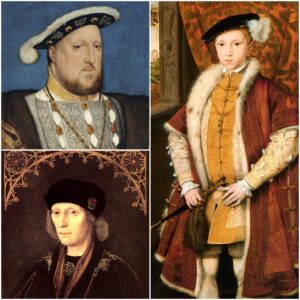 On Friday 28th January 1547 the fifty-five-year-old King Henry VIII died at the Palace of Whitehall.
On Friday 28th January 1547 the fifty-five-year-old King Henry VIII died at the Palace of Whitehall.
His death was kept secret until 31st January, giving the King’s Council time to discuss what was going to happen regarding the accession of Henry VIII’s nine-year-old son, Edward, who became King Edward VI.
Chroniclers Edward Hall and Charles Wriothesley recorded the King’s death:
Also, on this day in history, on 28th January 1457, thirteen-year-old Margaret Beaufort gave birth to a son at Pembroke Castle, West Wales. The infant was named Henry after his half-uncle Henry VI.